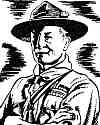|
A Radio Talk by Charles F. Kettering  The Boy Scout movement was established in England in 1908 by Lord
Baden-Powell to actively promote good citizenship - among the
youth of
that nation. There are many ways that this could be accomplished, but
the originator felt they all fell into three fairly definite classes.
Let us take a look at these objectives and see what they mean today.
The Boy Scout movement was established in England in 1908 by Lord
Baden-Powell to actively promote good citizenship - among the
youth of
that nation. There are many ways that this could be accomplished, but
the originator felt they all fell into three fairly definite classes.
Let us take a look at these objectives and see what they mean today.First of these aims is the development of character and initiative. The fundamental result of Scout training is the cultivation of individualism without developing egotism - a thing not easily done but one so important in a Democracy. The movement fosters self-expression and emphasizes the desire to learn rather than a passive reception of instruction. In other words, young people are encouraged to think and act for themselves rather than to follow blindly a fixed pattern of thought and action. |








